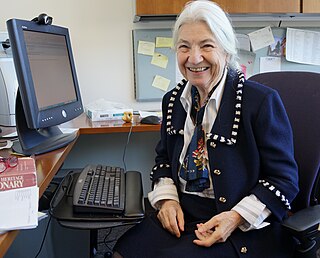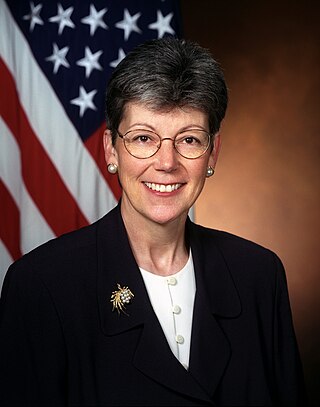Related Research Articles

Rosalind Wright Picard is an American scholar and inventor who is Professor of Media Arts and Sciences at MIT, founder and director of the Affective Computing Research Group at the MIT Media Lab, and co-founder of the startups Affectiva and Empatica.
James Loton Flanagan was an American electrical engineer. He was Rutgers University's vice president for research until 2004. He was also director of Rutgers' Center for Advanced Information Processing and the Board of Governors Professor of Electrical and Computer Engineering. He is known for co-developing adaptive differential pulse-code modulation (ADPCM) with P. Cummiskey and Nikil Jayant at Bell Labs.

The MIT School of Engineering (SoE) is one of the five schools of the Massachusetts Institute of Technology, located in Cambridge, Massachusetts, United States. SoE has eight academic departments and two interdisciplinary institutes. The School grants SB, MEng, SM, engineer's degrees, and PhD or ScD degrees. As of 2017, the Dean of Engineering is Professor Anantha Chandrakasan. The school is the largest at MIT as measured by undergraduate and graduate enrollments and faculty members.

S. Shankar Sastry is the Founding Chancellor of the Plaksha University, Mohali and a former Dean of Engineering at University of California, Berkeley.
Leah H. Jamieson is an American engineering educator, currently the Ransburg Distinguished Professor of Electrical and Computer Engineering at Purdue University. Jamieson was a founder of the Engineering Projects in Community Service program (EPICS), a multi-university engineering design program that operates in a service-learning context. She is a recipient of the Gordon Prize. From 2006-2017, she served as the John A. Edwardson Dean of Engineering at Purdue.

Ruzena Bajcsy is an American engineer and computer scientist who specializes in robotics. She is professor of electrical engineering and computer sciences at the University of California, Berkeley, where she is also director emerita of CITRIS.

Delores Maria Etter is a former United States Deputy Under Secretary of Defense for Science and Technology from 1998 to 2001 and former Assistant Secretary of the Navy for research, science, and technology from 2005 to 2007.
Jennifer Sandra Cole is a professor of linguistics and Director of the Prosody and Speech Dynamics Lab at Northwestern University. Her research uses experimental and computational methods to study the sound structure of language. She was the founding General Editor of Laboratory Phonology (2009–2015) and a founding member of the Association for Laboratory Phonology.
William Eric Leifur Grimson is a Canadian-born computer scientist and professor at the Massachusetts Institute of Technology, where he served as Chancellor from 2011 to 2014. An expert in computer vision, he headed MIT's Department of Electrical Engineering and Computer Science from 2005 to 2011 and currently serves as its Chancellor for Academic Advancement.

Lise Getoor is a professor in the computer science department, at the University of California, Santa Cruz, and an adjunct professor in the Computer Science Department at the University of Maryland, College Park. Her primary research interests are in machine learning and reasoning with uncertainty, applied to graphs and structured data. She also works in data integration, social network analysis and visual analytics. She has edited a book on Statistical relational learning that is a main reference in this domain. She has published many highly cited papers in academic journals and conference proceedings. She has also served as action editor for the Machine Learning Journal, JAIR associate editor, and TKDD associate editor.

John Silvanus Wilson, Jr. is an American academic administrator who served as the 11th president of Morehouse College from 2013 to 2017. Before returning to lead his alma mater in 2013, Wilson served in the United States Department of Education, at George Washington University, and the Massachusetts Institute of Technology.
Radhika Nagpal is an Indian-American computer scientist and researcher in the fields of self-organising computer systems, biologically-inspired robotics, and biological multi-agent systems. She is the Augustine Professor in Engineering in the Departments of Mechanical and Aerospace Engineering and Computer Science at Princeton University. Formerly, she was the Fred Kavli Professor of Computer Science at Harvard University and the Harvard School of Engineering and Applied Sciences. In 2017, Nagpal co-founded a robotics company under the name of Root Robotics. This educational company works to create many different opportunities for those unable to code to learn how.
Victor Waito Zue is a Chinese American computer scientist and professor at Massachusetts Institute of Technology.
Ronjon Nag is a British-American inventor and entrepreneur specializing in the field of mobile technology. He co-founded the technology company Lexicus, acquired by Motorola in 1993 and Cellmania, acquired by Research in Motion in 2010. He later served as Vice-President of both Motorola and BlackBerry.

Reza Ghodssi is a Professor in the Department of Electrical and Computer Engineering and the Institute for Systems Research (ISR) at the University of Maryland, College Park, where he directs the MEMS Sensors and Actuators Lab and holds the Herbert Rabin Distinguished Chair in Engineering. Ghodssi is also the Inaugural Executive Director of Research and Innovation for the A. James Clark School of Engineering at the University System of Maryland at Southern Maryland (USMSM). He is best known for his work designing micro- and nano-devices for healthcare applications, particularly for systems requiring small-scale energy conversion and biological and chemical sensing.

Muyinatu "Bisi" A. Lediju Bell is a researcher and faculty member. She is the John C. Malone Associate Professor of Biomedical Engineering, Electrical and Computer Engineering, and Computer Science at Johns Hopkins University. She is also the director of the Photoacoustic and Ultrasonic Systems Engineering Laboratory.
Pamela A. Abshire is an American engineer. She was elected a Fellow of the Institute of Electrical and Electronics Engineers in 2018 for her contributions to CMOS biosensors.
Margaret Kahn is an internationally known American writer and linguist. She is the author of Children of the Jinn: In Search of the Kurds and Their Country, first published by Seaview Books in 1980 with a second updated edition issued in 2020. She is also the author of Borrowing and Variation in a Phonological Description of Kurdish. She wrote the entry on Kurds in The Harvard Encyclopedia of American Ethnic Groups. Her articles on phonetics and phonology have appeared in a number of academic journals, and her short stories have been published both in literary journals and popular magazines. Her plays have been produced at theaters in California and Maryland.
Ramalingam "Rama" Chellappa is a Bloomberg Distinguished Professor, who works at Johns Hopkins University. At Johns Hopkins University, he is a member of the Center for Language and Speech Processing, the Center for Imaging Science, the Institute for Assured Autonomy, and the Mathematical Institute for Data Sciences. He joined Johns Hopkins University after 29 years at The University of Maryland. Before that, he was an assistant, associate professor, and later, director, of the University of Southern California's Signal and Image Processing institute.
Alisa Morss Clyne is an American mechanobiologist. She is a Full Professor and Associate Chair of Diversity, Equity, and Inclusion in the Fischell Department of Bioengineering at the University of Maryland, College Park. Clyne is an expert in endothelial cell biology, biomechanics, and metabolomics.
References
- 1 2 3 "University of Maryland – Department of Electrical and Computer Engineering – Carol Espy-Wilson Home Page". Archived from the original on 2012-06-22.
- ↑ Williams, Clarence (2001). Technology and the Dream : Reflections on the Black Experience at MIT, 1941–1999. Cambridge, MA; London, England: The MIT Press. p. 545. ISBN 0-262-23212-X.
- 1 2 3 4 "Carol Espy-Wilson". Who's who among African Americans. Tara E. Atterberry, Jessie Carney Smith (Thirty sixth ed.). Detroit, Michigan. 2021. ISBN 978-0-02-867754-5. OCLC 1240728674.
{{cite book}}: CS1 maint: location missing publisher (link) CS1 maint: others (link) - 1 2 Davis, Edward (December 2005). "Achieving siblings gathering to celebrate family matriarch". CrossRoadsNews. Archived from the original on 2013-01-20.
- ↑ Espy, Carol (May 1981). Effects of Noise in Signal Reconstruction From its Fourier Transform Phase. Cambridge, MA: S. M. Thesis, Department of Electrical Engineering and Computer Science, Massachusetts Institute of Technology.
- ↑ "Degrees Offered and Degree Requirements". MIT Electrical Engineering and Computer Science Graduate Program. Archived from the original on 2006-01-16.
- ↑ Stevens, Kenneth. "Professor of Health Sciences and Technology Emeritus". Research Laboratory of Electronics at MIT. Archived from the original on 2012-04-19.
- ↑ Espy-Wilson, Carol (1987). An acoustic-phonetic approach to speech recognition : application to the semivowels (PDF). Cambridge, MA: Massachusetts Institute of Technology, Research Laboratory of Electronics.
- ↑ "Research Laboratory of Electronics (RLE) Progress Report 143" (PDF).
- ↑ "UMD – Speech Communication Laboratory Home Page".
- ↑ "Carol Espy-Wilson | ADVANCE". advance.umd.edu. Retrieved 2022-03-29.
- ↑ "Mtech TAP Company CosmosID™ Wins Best Life Sciences Company in the Maryland Incubator Company of the Year Awards" (Press release). prnewswire.com.
- ↑ Maxwell, Jill Hecht. "Carol Espy-Wilson, SM '81, EE '84, PhD '87". MIT Technology Review. Retrieved 2018-01-26.
- ↑ "Carol Espy-Wilson". Radcliffe Institute for Advanced Study at Harvard University. Retrieved 2022-03-29.
- ↑ "2022 newly elevated fellows" (PDF). IEEE. Retrieved 2022-02-23.
- 1 2 "John Silvanus Wilson, Jr.'s Biography". The HistoryMakers. Retrieved 2020-12-12.
- ↑ Brown, Nell Porter (2013-10-15). "Morehouse Man, Redux". Harvard Magazine. Retrieved 2020-12-12.
- ↑ "John S. Wilson, Jr. – White House Initiative on Historically Black Colleges and Universities". Department of Education – ed.gov. Archived from the original on 2012-09-26. Retrieved 2012-05-06.
- ↑ Williams, Clarence (2001). Technology and the Dream : Reflections on the Black Experience at MIT, 1941–1999. Cambridge, MA; London, England: The MIT Press. pp. 545, 858. ISBN 0-262-23212-X.